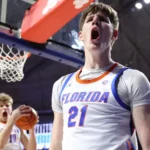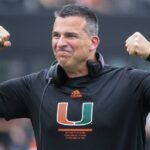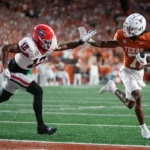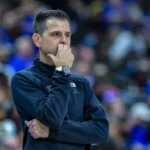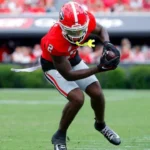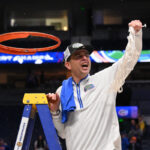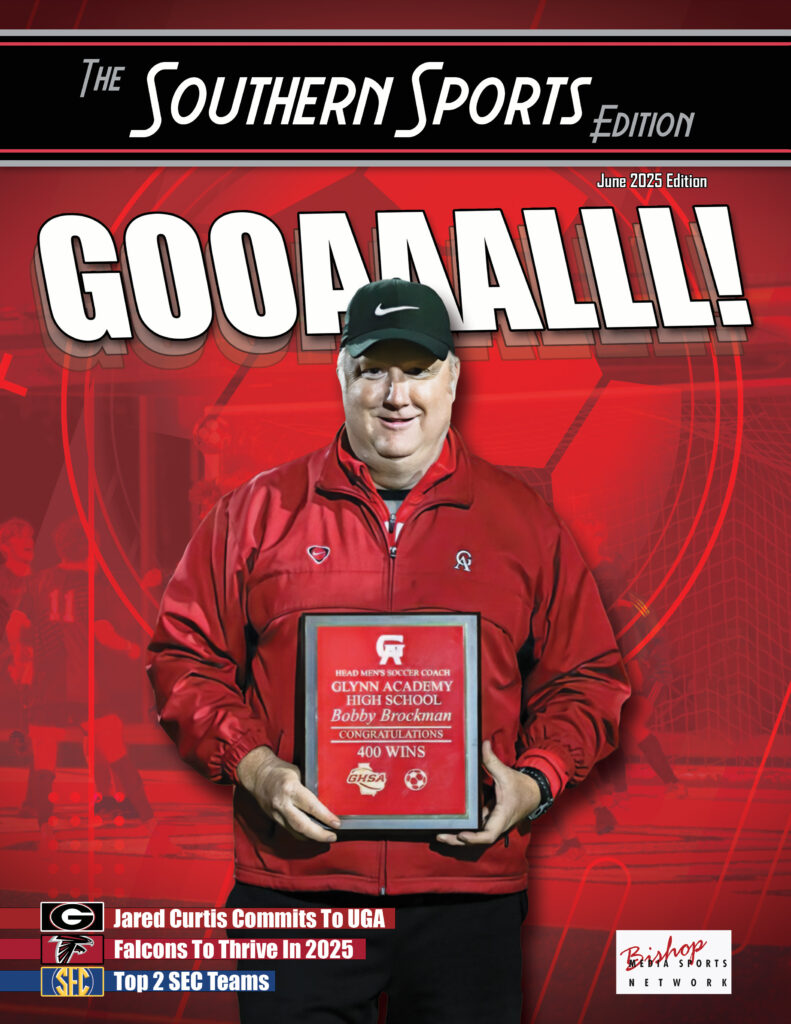Robert Craft
I’ll Be Back
 By: Robert Craft
By: Robert Craft
TheSouthernSportsEdition.com news services
Alex Condon will return to Florida for his junior season.
The Florida men’s basketball program’s roster for the 2025-26 season, as of today, is essentially complete: with one starting roster spot available for a development-focused player.
What started out as a slow transfer portal turned into a masterclass by Florida’s newly equipped coaching staff.
It’s readily apparent the Gators have the pieces in place to make a second run for a national championship under head coach Todd Golden, mirroring his predecessor Billy Donovan. As difficult of a feat as it is to accomplish, they are once again a serious contender coming off a National Championship.
As for replacing Walter Clayton Jr., Florida brought in a mid-major transfer, Princeton’s Xaivian Lee, giving the Gators a crafty and explosive guard who excels with the ball in his hands.
Lee has an impressive first step, with the speed to blow by his defender and the court vision to attempt a high-percentage look or find the open man when the defense collapses.
While some may question his ability to succeed at a similar rate in the nation’s toughest conference, Lee consistently dominated Power Four competition when given the opportunity, and he stood out in 2024 at the G League Combine. He proved that he can play and succeed against the country’s best.
Continuing to target the backcourt, Florida keyed in on Ohio University transfer AJ Brown, who will presumably fill a role similar to Will Richard’s: a lights-out shooter from long-range who provides impressive defense and the ability to battle on the boards in the low post.
Brown is projected to begin the season as Florida’s 6th man, followed by center Micah Handlogten, giving the Gators a polished, experienced scorer in the second unit.
Although Brown may not start from the jump in Gainesville, the Gators intend to spend the summer evaluating their rotation. It’s possible Thomas Haugh returns to a bench role, with Brown sliding into the three spot for the Gators.
Only time will tell how Brown fits into UF’s rotation, though it’s in my opinion an impressive addition, one which will benefit his younger brother, Isaiah Brown, too.
Speaking of Isaiah, anyone who is underestimating the Orlando native: it would not be a surprise to see Isaiah Brown play a notably increased role during his sophomore season.
He’s an impressive outside scorer and he’s physical, yet quick enough to defend one through three although he did not display his full potential last season. The coaching staff thinks highly of Isaiah Brown, and that extra regard and attention goes a long way.
Meanwhile, Florida prepared contingency in late April. The Gators’ coaching staff recruited and acquired one of the nation’s top freshmen during 2024-25.
You know, the one who pulled out of the 2025 NBA Draft and will return to college for one more year, but not at Arkansas.
As critical as retention was, it’s the additions that may put Florida firmly back in contention for a title, and not just via the transfer.
After retaining, reconstructing, and retooling, the Gators managed the previous two months as well as any program could hope for, and expectations will undoubtedly be enormous.
Florida should be a preseason top 10, if not a top five team, in the months ahead, and it’s because the Gators are coming off their third national championship in program history AND Florida dominated this spring.
The schedule will be daunting throughout the upcoming season. The non-conference slate should be more challenging than it was during the 2024-25 campaign, and Southeastern Conference play will consistently challenge each of the league’s 16 member schools.
If the Gators stay healthy they will handle the weight of expectation. Perhaps if they keep their underdog mentality from last season, Florida will contend for a second-straight national championship following Condon’s decision to return to Florida.
The College Diamond
 By: Robert Craft
By: Robert Craft
TheSouthernSportsEdition.com news services
64 NCAA Tournament teams will be announced next Monday, and the SEC is in position to grab up to 10 of the 16 Regional host sites and six of the eight national seeds.
Heading into conference tournaments, these seven teams have all but locked up a top eight seed, which means home-field advantage all the way through the Super Regionals. Teams are in order of RPI, not projected seed.
Georgia (1)
Auburn (2)
Vanderbilt (3)
Texas (4)
Arkansas (5)
LSU (8)
Teams on the hosting bubble.
Alabama (9)
Florida (13)
Tennessee (16)
Ole Miss (18)
Some notes on the bracket hopefuls: Alabama’s RPI is very strong, but the Crimson Tide have only two series wins against Tournament-caliber teams (Oklahoma and Georgia).
Florida went 15-15 in the SEC, but six of those wins came against South Carolina and Missouri. On a positive note, the Gators won series vs. Texas (on the road) and Arkansas.
Tennessee went 16-14 in the SEC and lost their last five series. They have one of the weakest non-conference schedules (216).Tennessee has joined a long list of defending national champions that have struggled, relatively speaking, the following season.
Only one of the last 10 national champs, 2017 Florida, was a top eight seed the following season (the Gators were No. 1 overall). Four of the other nine were hosts but not top eight seeds, and four failed to make the tournament.
Florida miraculously ended its 2025 regular season .500 in Southeastern Conference play after opening 1-11 against league squads, capping off the turnaround with a series victory over Alabama at home on Saturday [W 7-6; L 6-9; W 9-3] and securing the No. 10 seed in the upcoming SEC Tournament.
Vanderbilt, the 2019 champs, did not have an opportunity to defend its title due to the pandemic. The Commodores were the No. 4 overall seed in 2021.
Vanderbilt enters the postseason as one of the hottest teams in the country. The Commodores won their final five SEC games — many in dramatic fashion — to finish 39-16 overall and 19-11 in the SEC.
Vanderbilt swept Kentucky in Nashville over the weekend, winning the first two games on back-to-back walk-off home runs. Outfielder Braden Holcomb, down to his final strike with two outs, hit a three-run blast to give Vanderbilt an 8-7 win.
Then, after Kentucky rallied from down 7-5 at the top of the ninth to take an 8-7 lead, shortstop Jonathan Vastine hit a two-run home run with one out to walk off the Cats once again.
These heroics were nothing new for Vanderbilt. Two weeks earlier, the Dores rallied from down 7-2 in the eighth to beat Alabama with a two-run Holcomb homer with two outs in the bottom of the ninth.
For Kentucky, it was a painful ending to a regular season that featured eight SEC losses by one run and another three by two runs.
At 29-23 overall and 13-17 in the SEC with an RPI of 36, the Cats head to the SEC Tournament on the NCAA Tournament bubble. They play Oklahoma on Tuesday.
The SEC will be well represented and this year‘s College Baseball World Series tournament. It’s just a matter of who will host and who will travel.
I predict four SEC teams will make it to Omaha and one will be crowned national champion.
Storm Brewing?
 By: Robert Craft
By: Robert Craft
TheSouthernSportsEdition.com news services
The Hurricanes won 10 games for only the second time in 20 years.
Their explosive offense led the nation in scoring (43.9 points) and produced the No. 1 pick in the NFL Draft. Still, 2024 still felt like a disappointment.
Miami’s defense was sabotage in action finishing 69th in scoring (25.3 points) and allowing 61 plays of 20-plus yards (94th nationally).
Their defensive performance was why Miami missed the College Football Playoff with a 42-38 loss at Syracuse in the final weekend of the regular season to knock them out of the conference championship.
Often praised for his recruiting, coach Mario Cristobal elevated Miami, a team who signed top 10 recruiting classes in 2023 and 2024. The Hurricanes don’t play defense, which falls on coaching.
Cristobal hired Minnesota defensive coordinator Corey Hetherman, who led a top 10 scoring defense (16.9 points) that finished 12th in yards per play allowed (4.76) in 2024. Miami gave up 30+ points in six of its 13 games last season. Meanwhile, Iowa was the only team that scored 30 points on Minnesota last year.
Miami made a concerted effort to retool its secondary by bringing in six transfers, headlined by Xavier Lucas from Wisconsin and, most recently, Houston/Auburn transfer Keionte Scott.
Miami has holes to fill on offense, too. In addition to Cam Ward, the Hurricanes lost their top four wideouts (Xavier Restrepo, Jacolby George, Isaiah Horton and Sam Brown) and tight end Elijah Arroyo.
Most notably, there was the high-profile addition of Carson Beck, Georgia’s top quarterback. Praise be the transfer portal!
Miami is very fortunate to have replaced Ward immediately and keep their momentum on offense.
In addition, Miami landed several receiver transfers: CJ Daniels (LSU/Liberty), Keelan Marion (BYU) and Tony Johnson (Cincinnati).
Beck didn’t throw in the spring while recovering from an elbow injury he suffered in the SEC Championship Game.
He’ll have to develop chemistry with a new set of receivers and acclimate to a new offense quickly — and get more help from the revamped defense than Ward did — for Miami to win the ACC for the first time and earn a Playoff spot.
The Canes NIL presence has always been well known. LifeWallet CEO John Ruiz made the Hurricanes an immediate player in the name, image, and likeness space by doling out millions to bring talent to South Florida.
While his involvement with the program has since faded given some recent financial issues, the school’s attitude towards utilizing NIL to build its roster hasn’t budged.
Miami’s NIL estimated spin for 2025 it’s between $20-$25 million.
Miami’s investment paid off on the recruiting trail where they were able to convince top prospects to spurn notable programs in order to sign with The U.
The Canes are just below Texas and Georgia for the most estimated NIL spend in the country.
Will it translate into wins on Saturday, an ACC championship and a college football playoff slot?
The Top 2 Teams
 By: Robert Craft
By: Robert Craft
TheSouthernSportsEdition.com news services
Finally, the coast is clear to make grand proclamations about the upcoming SEC football season. The transfer portal has closed (at least for departures), and there are no season-changing athletes on the market.
So, as we unwind this offseason and take a look around, here are two grand proclamations:
- The SEC’s two best teams are clearly Texas and Georgia, and in that order.
- After that, it’s wide open.
What did we expect? The two best teams are the two that made the conference championship game and were the last two SEC teams in the College Football Playoff.
It’s just the obvious conclusion, especially after a spring that saw both programs only solidify their spots, especially through the portal.
When predicting third place and onward, a glut of candidates exists and none is a clear favorite? Inevitably, some team will emerge to challenge or perhaps leapfrog Texas and Georgia, maybe there’s more than one team who does it.
At this stage, picking teams requires a confidence level that today’s facts don’t match. There are plenty of candidates with plenty of flaws among them. There will be carnage in any SEC schedule; each team saw plenty of injuries last year, and this year’s slate is essentially the same, just with the home sites flipped.
Texas and Georgia meet on Nov. 15 in Athens. They met in October last year and managed a rematch in Atlanta. That they could do so again was buttressed by their offseasons.
Texas: In perhaps the smoothest quarterback transition ever, Arch Manning steps in after two years of occasional starts for Quinn Ewers, who played well for Texas but wasn’t so irreplaceable that the NFL deigned to pick him in the first six rounds of the NFL draft.
The Longhorns then armed Manning this spring with help from the Bay Area: receiver Emmet Mosley V (Stanford) and tight end Cal Endries (Cal). These additions will pair with Ryan Wingo and DeAndre Moore returning this season, both finishing in the top five in receiving yards on last year’s team .
On defense, Texas signed five defensive linemen between the two portal periods. Right now, they have one of the best front sevens in college football, if not the best.
Between that, the projected passing game and the program’s status as the only team to make the last two CFPs.
Not to mention their surprisingly manageable schedule this year, it’s easy to pick the Longhorns as national preseason No. 1.
Georgia: Kirby Smart has never been heavy on the portal.
He prefers to use it strategically. This year’s portal haul is consistent to previous years, but this year, especially if Georgia ends up returning to the national championship game, transfers will be the reason they got there.
The post-winter window was successful enough. Georgia needed receivers and got them: Noah Thomas (Texas A&M) out wide and Zachariah Branch (USC) in the slot, plus Zachariah’s brother Zion Branch and two others for depth at safety.
The post-spring window may have been just as big.
Elo Modozie (Army) could start right away, and tailback Josh McCray (Illinois) gives the Bulldogs an experienced tailback, which was badly needed after Trevor Etienne went pro.
These weren’t eye-popping, multi-million-dollar deals, but they shored up weak spots.
Also, Georgia didn’t lose any key players in the post-spring window AND didn’t suffer any long-term injuries during spring practice.
Georgia’s roster is fortified for another national championship run, with things depending on two spots: starting quarterback Gunner Stockton and a young offensive line. The theme of spring practice was that the team feels good about Stockton.
There’s no guarantee Texas or Georgia win the conference title or even make the Playoff, but would you bet against it?
As things stand now, they are clearly the two best teams in the SEC. And the teams who emerge behind or through them will be fascinating to watch.
Well over half the league has an argument to make a push into the top tier, and that should make for a compelling season.
Prankster
 By: Robert Craft
By: Robert Craft
TheSouthernSportsEdition.com news services
The Atlanta Falcons, alongside defensive coordinator Jeff Ulbrich and his son offered public apologies on Sunday to Shedeur Sanders regarding a prank call during the second round of the NFL Draft.
Jax Ulbrich, son of Jeff Ulbrich, also offered an apology via Instagram.
The Falcons have decided not to punish their defensive coordinator for his son’s actions, according to team sources.
While the Cleveland Browns eventually stopped Sanders’ highly publicized slide to the fifth round, a prank call to Sanders’ draft phone Friday night claimed that he would be taken with the 40th pick by the New Orleans Saints.
“This is Mickey Loomis here, (general manager) of the Saints. It’s been a long wait, man. We’re gonna take you with our next pick right here, man,” the caller said. The prank call was captured on video by Well Off Media, a YouTube channel run by Deion Sanders Jr., Shedeur’s older brother.
“Yes sir, let’s be legendary,” Sanders said.
“But you’re gonna have to wait a little bit longer, man. Sorry about that,” the caller said before hanging up. The Saints eventually picked Louisville quarterback Tyler Shough.
Over the weekend, a video that appeared to capture the exchange from the prank caller’s point of view began circulating on social media.
The call was made to a phone Sanders purchased specifically for the draft. He received the phone Thursday and only shared the number in an email thread that the NFL sent to teams.
Prank calls are not uncommon in the long history of the NFL draft. Philadelphia Eagles cornerback Cooper DeJean received a prank call during the 2024 draft while in the green room just before his eventual selection, and several other players have their own draft day prank stories.
“Nobody has that number but coaches, strictly for that reason,” Sanders said. “Why get mad? They want you to have a certain type of reaction to it. They want you to feel bad. But I ain’t trippin’.”
Let me just get right to it — from the start of the draft Thursday night until Saturday afternoon (when Sanders was finally picked), I was fascinated by Mel Kiper Jr. and his off the rails behavior; between his accolade as the most prolific and prominent draft analyst of all time, and the reality that his assessment was rejected by the entire league, over and over and over caused Kiper Jr. to lull and backtrack
When Sanders was finally drafted, Kiper Jr. embodied his enthusiasm and rapid-fire cadence like he was suddenly given a shot of adrenaline — a clearly practiced monologue he had been waiting 42 hours and 18 minutes to make. It felt less like a victory for the athlete and more like a catharsis for the analyst.
Let’s take a look at the subsequent 20-minute discussion about Shedeur by ESPN — especially when Rece Davis and Louis Reddick thoughtfully discussed what Sanders needed to take from his draft experience.
Suddenly, Mr. Mel let 48 hours of frustration explode, culminating in this absolute banger of a quote:
“The NFL has been CLUELESS evaluating quarterbacks!”
Was the Shedeur Sanders story compelling TV or, especially in the end, a little lamentable? What do we think of the relationship between the media frenzy and the end result?
Run
 By: Robert Craft
By: Robert Craft
TheSouthernSportsEdition.com news services
They all should have known better.
Jarred Kelenic should have ran. Brian Snitker should have benched his talent. And Ronald Acuña Jr. should have addressed the double standard internally rather than taking to X to say, “If it were me, they would take me out of the game.”
Acuña, who is not with the Atlanta Braves while recovering from a torn left ACL, later deleted his controversial post. The problem for Snitker, a Braves lifer, is that his star right fielder essentially stated a fact.
Snitker removed Acuña from a game in August 2019 for the same offense Kelenic committed Saturday night; failing to run hard on a fly ball out of the batter’s box he thought would be a home run.
He also pulled Ender Inciarte for lack of hustle in July 2018 and Marcell Ozuna for the same misstep in June 2023. Do you sense a pattern?
Snitker defended Acuña when the Miami Marlins repeatedly drilled Acuña in 2018. He continued playing Ozuna when many Braves fans booed him and wanted him released during his slow start to the 2023 season. And those are just two examples.
Still, just as players make mistakes, so do managers. Snitker hardly distinguished himself with his failure to bench Kelenic and his feeble responses to reporters’ questions about the incident the past two days.
Consider what Snitker said after benching Acuña, then the reigning NL Rookie of the Year, in 2019:
“He didn’t run. You’ve got to run. It’s not going to be acceptable here. As a teammate, you’re responsible for 24 other guys. That name on the front is a lot more important than the name on the back of that jersey.
“You can’t do that. We’re trying to accomplish and do something special here, and personal things have to be put on the back burner. You just can’t let your team down like that.”
Snitker should have taken the same stance with Kelenic, a struggling player and easier target than Acuña, a future MVP. Kelenic very well could be the player sent to Triple A when Acuña rejoins the Braves, possibly in early May.
Acuña was 21 then. He is 27 now, married with two sons. The general consensus around the Braves in recent seasons was that he matured, in the way most young players do in the MLB.
His post on X, like many reactions on social media, was made in the heat of the moment. But if there’s one thing players detest in managers, it’s inconsistency. Snitker was inconsistent with Kelenic. Acuña can be forgiven for lodging an objection.
How will this play out?
Bombs Away
 By: Robert Craft
By: Robert Craft
TheSouthernSportsEdition.com news services
Torpedo bats have been the main focus of baseball at the start of the 2025 MLB season and bat companies are winning big as a result.
Marucci and Victus, the new official bats of MLB, as well as Chandler were the first manufacturers to put torpedo bats on sale, at prices ranging from $199 to $239.
MLB Commissioner Manfred also called torpedo bats, another relatively new advancement in the sport that’s rapidly gaining popularity, “absolutely good for baseball.”
The bats differ from traditional models due to their shape, which comes from redistributing their weight so that the densest part, or the “sweet spot,” is closer to the handle.
The barrel (where players want the bat to make contact with the ball) is bigger. These bowling-pin-shaped bats have sparked interest among players and spurred discussions among fans, and of course Manfred supports the interest and attention.
The Yankees helped bring the torpedo bats mainstream earlier in the season after they hit 15 homers and scored 36 runs in only three games against the Milwaukee Brewers.
Five Yankees — Cody Bellinger, Jazz Chisholm Jr., Paul Goldschmidt, Anthony Volpe and Austin Wells — used torpedo bats in the opening 4 game series, and they combined for 10 of the club’s record-setting 18 home runs in its first four games.
If not for the initial offensive barrage from the Yankees, it’s likely the level of interest in the torpedo bats would not be so pronounced.
Torpedo bats are recently mainstream, but they were being used under the radar in 2024. Yankees slugger Giancarlo Stanton used a torpedo bat all last season and finished with his best stats since 2021.
Behind the scenes, Stanton’s adoption of the technology during his torrid postseason last October started generating buzz in the bat industry, according to Smith. Stanton had seven home runs and a 1.048 OPS for the Yankees in the 2024 playoffs.
New York Mets superstar shortstop Francisco Lindor also used a torpedo bat last season and finished second in the National League MVP voting.
While the bats have only recently become a major storyline across the league, it turns out that uniquely shaped bat experiments have actually been happening quietly across baseball for a long time. Why the national uproar now on bat technology?
Torpedo bats are not under the radar anymore. Players across the sport have started asking manufacturers for their own versions.
Birch seems to be the preferred wood for the bats, which were designed to help hitters make truer contact in an age where more and more pitchers are throwing 100 mph and offering nastier repertoires than ever.
For decades in baseball’s past, players swung bats made of ash until Barry Bonds (with the help of steroids) helped popularize maple in the late 1990s and early 2000s.
Christian Yelich was happy that there was a possible technological advancement in hitting. Yelich noted that over the past several years, most of the advancements have come on the pitching side.
Torpedo bats might be the response to the technical and analytical advancements that pitching has seen in the past 5-10yrs.
In other words, time for the hitters to get their turn.
The Next Chomp?
 By: Robert Craft
By: Robert Craft
TheSouthernSportsEdition.com news services
The Florida Gators are the national champion after a 65-63 win over Houston.
At a glance, it looks like everyone just left a time machine.
A 30-something former college point guard with one stopover as a mid-major coach takes over and eventually puts together a deep, balanced roster that’s remarkably efficient on both ends of the floor. A title follows.
Florida forced four turnovers in the last two minutes. The title was won on a stop and a scramble for a loose ball as time ran out. The defense displayed dominance during the most critical point in the game.
The two-point final margin? It matched the Gators’ largest lead of the night. Florida scored the second-fewest points they had all year in the championship game. Their comeback (a third in a row in this event) tied for the third-largest comeback in men’s championship game history.
This version of Florida does have some conspicuous differences from the one Billy Donovan first led to the pinnacle in 2006, nine years after arriving from Marshall.
Today’s head coach obsesses over data and analytics and unflinchingly runs a system with origins in the Ivy League in the most obsessively competitive athletic conference in the country.
Walter Clayton Jr., the inaugural first-team All-American in program history and the Final Four Most Outstanding Player — was a four-star football prospect who started at Iona as a good passer that was “a little bit heavy,” in the estimation of his coach, Rick Pitino.
All things considered, cutting the net would’ve been easier. This NCAA Tournament has made one thing abundantly clear: There is no Venn diagram, ever, in which “easy” and Walter Clayton Jr.’s name overlap.
How does anyone explain a former zero-star recruit winning most outstanding player in the toughest Final Four of all time? So perhaps it shouldn’t be surprising that as Clayton ascended a ladder , scissors in hand, he went to snip at a championship net … only to realize he didn’t need to.
Twenty minutes later, Clayton made a beeline to celebrate with the people he’d come to Florida with in the first place. Kindly requesting no questions or other distractions.
This group raised the trophy after conquering the most loaded Final Four in history, and the Gators are another unified team assuring that they will be among the favorites to do so again next spring.
Florida will lose very important cogs like Clayton, Martin, and two assistants. Golden’s de facto offensive and defensive coordinators accepted head coaching jobs elsewhere.
Florida still might be the preseason No. 1 and should be among the top contenders for the 2026 national title.
Finally, the ambition of Coach Golden has never been terribly difficult to measure, which means the Billy Donovan comparisons may run even deeper.
Florida is the first and only program to win three National Championships in both football and basketball.
Wrong Turn
 By: Robert Craft
By: Robert Craft
TheSouthernSportsEdition.com news services
Georgia Bulldogs wide receiver Nitro Tuggle was arrested early on March 25 on two misdemeanor charges: reckless driving and speeding-maximum limits.
He was booked into Athens-Clarke County jail just before 2 a.m., with his bond set at $26.
Georgia announced that Tuggle has been suspended indefinitely. He will be a sophomore this season and has become one of many UGA football players to be arrested on driving-related charges.
Georgia also announced that Marques Easley, a second-year offensive lineman, is suspended indefinitely. Easley was charged with misdemeanor reckless conduct after crashing in front of an apartment complex with no injuries.
The situation involving Georgia offensive lineman Marques Easley has taken another turn.
Easley was arrested in Oconee County on Friday and was charged with reckless conduct and reckless driving. According to jail records, the 19-year-old was booked at 4:35 p.m. on Friday and released at 5:04 p.m. on a $1,000 bond. The details regarding Easley’s class were made public on Friday.
According to the crash report from the incident, Easley’s 2021 Dodge Challenger was traveling west on Redwood Lane in Watkinsville in what the reporting officer described as “a reckless regard” on Monday.
Easley lost control of the vehicle, which began to rotate clockwise and run off the roadway before striking a power distribution box with its front. The vehicle then struck the passenger side of a second vehicle — a 2013 Hyundai Elantra — with its driver’s side.
Per the report, that impact caused the Elantra to strike a third vehicle — a 2018 Mercedes Benz CLA — with its driver side.
The Challenger’s impact with the Elantra caused the Challenger to hit the front of 1313 Redwood Lane with its front before it came to a final rest.
Per the report, Easley told the reporting officer he lost control of the car while “traveling between 25-30 MPH prior to the crash.” The crash report states that “the investigating troopers found this to be an inaccurate account of [what] happened due to the amount of damage from the crash and the fact that [Easley’s Challenger] had tire marks going back an estimated 200 feet.”
“The tire marks were consistent with a vehicle laying drag,” the report stated.
Easley was taken to Piedmont Athens Regional due to the accident, though the details of his injuries were not listed in the crash report.
A second Georgia player — cornerback Ondre Evans — was listed on the crash report among the six occupants involved. Evans was not taken to the hospital following the accident.
The crash report states that Easley was given three citations for the incident: one for reckless driving and two for reckless conduct causing harm to or endangering the bodily safety of another.
Easley’s arrest is the 10th known arrest of a Georgia football player for driving-related offenses since the big incident in January 2023: player Devin Willock and staffer Chandler LeCroy were killed in a high speed car accident.
LeCroy was found to be over the legal drinking limit and racing with Jalen Carter, who pleaded no contest to two misdemeanors and therefore did not serve any jail time.
Coach Smart said last summer that the program was doing several things to limit, then eliminate these persistent driving issues with players.
Guest speakers have made several appearances to the team and Georgia’s collective is set to withhold payments to the players. Smart called the fines “substantial”.
Chomping The Hardcourt
 By: Robert Craft
By: Robert Craft
TheSouthernSportsEdition.com news services
It’s been seven years since Florida Basketball finished with fewer than 10 losses. It’s been 11 years since the Gators won the SEC championship, and it felt like the Gators’ days as an elite basketball program were a thing of the past.
Then, Todd Golden and his Gators thumped Tennessee, 86-77, for their first SEC Championship since 2013.
UF entered the NCAA Tournament as a No. 1 seed for the first time since Billy Donovan. It will finish with no more than five losses for only the third time in the last 50 years.
Florida went 16-17 in Golden’s first season, their second losing season since the turn of the millennium. Still, confidence in Golden’s direction never wavered despite obvious lack of experience at 36 years old. Todd Golden was six years younger than the youngest SEC coach at the time.
At the same time, Golden had three years of head coaching experience at San Francisco and had led the Dons to a 57-36 overall record (.613) before arriving in Gainesville. Golden credits Florida’s quick turnaround to acquiring talent that fit a certain strand he was developing in the halls of the O’Connell Center.
The Gators are approaching a hot stretch. They beat five top-25 teams over their last six games. Star guard Walter Clayton Jr. scored a minimum of18 points in five-straight outings, but Florida’s strengths go beyond the backcourt. This team possesses a deep and balanced roster that stands near the top of the national leaderboard in a number of statistical metrics.
Florida did not lose a non-conference game. All four of their losses were tournament-bound teams. Golden coaches a squad with a high floor and a high ceiling, which could be conducive to a deep run through the 68-team bracket.
Forwards Alex Condo. And Thomas Haugh are versatile bigs who score, rebound and pass at high levels. Center Rueben Chinyelu is part of a stout rim-protecting unit that teams struggle to score against. The Gators’ defense ranks No. 10 nationally (KenPom) in efficiency, and it surrenders 69 points per game — an impressive mark in an explosive SEC conference.
Golden has yet to advance beyond the first round of the NCAA Tournament in his three years. A deep run this postseason would be a breakthrough for the rising star on the sideline.
For the first time in more than a decade, the SEC will win the national championship on the hardwood. Florida is arguably college basketball’s hottest team and they’re coming off a tournament title in Nashville.
The Gators are playing well at the most crucial time. The Florida Gators have been one of the most consistent squads this season and their elite level of competition has paved a clear path to the Final Four. From there, it’s all about which team executes.
